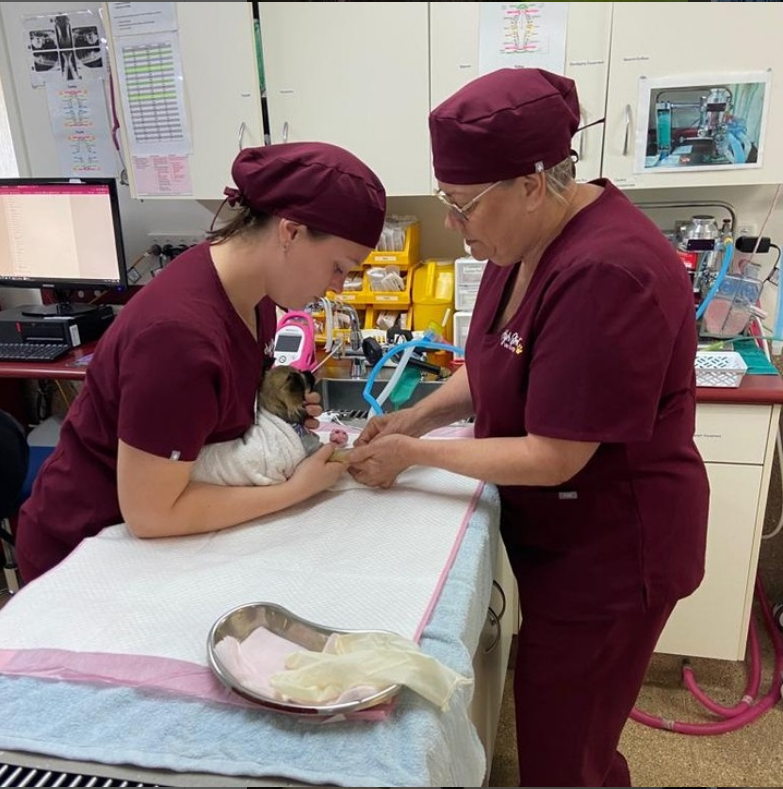
Miscarriage in Pregnant Dogs: Causes and Treatment
Miscarriage, also known as abortion, is the spontaneous pregnancy loss before the fetus is viable outside the womb. In dogs, miscarriage can occur anytime during pregnancy, but it is most common in the early stages.
There are many different causes of miscarriage in dogs, including:
- Infection: Infections such as brucellosis, canine herpesvirus, neosporosis, and toxoplasmosis can all cause miscarriage.
- Hormonal imbalances: Low levels of the hormone progesterone can lead to miscarriage.
- Uterine abnormalities: Structural abnormalities in the uterus can make it difficult for the fetus to develop properly and can lead to miscarriage.
- Trauma: Physical trauma to the abdomen can also cause miscarriage.
- Genetics: Some genetic defects can cause miscarriage.
- Nutritional deficiencies: A lack of essential nutrients can also lead to miscarriage.
- Certain medications: Some medications, such as corticosteroids and nonsteroidal anti-inflammatory drugs (NSAIDs), can increase the risk of miscarriage.
In some cases, the cause of a miscarriage is never identified.
Symptoms of miscarriage in dogs
The symptoms of miscarriage in dogs can vary depending on the cause and the stage of pregnancy. Some common symptoms include:
- Vaginal discharge, which may be bloody or contain aborted fetuses
- Abdominal pain and discomfort
- Lethargy and depression
- Loss of appetite
- Vomiting and diarrhea
- Fever
If you notice these signs in your pregnant dog, you must immediately take her to the veterinarian.
Diagnosing miscarriage
To diagnose miscarriage, your veterinarian will perform a physical examination and ask you about your dog’s medical history and symptoms. They may also order blood tests, X-rays, or an ultrasound to confirm the diagnosis and rule out other possible causes of the symptoms.

Treatment for miscarriage
There is no specific treatment for miscarriage. The goal of treatment is to support the dog and prevent complications. In some cases, the veterinarian may prescribe antibiotics to prevent infection. They may also recommend supportive care, such as fluids and pain medication.
If the miscarriage is complete, meaning all aborted fetuses have passed, the dog should recover within a few days. However, if the miscarriage is incomplete, meaning that some of the aborted fetuses are still in the uterus, the veterinarian may need to remove them surgically.
Preventing miscarriage
There is no guaranteed way to prevent miscarriage in dogs. However, there are some things you can do to reduce the risk, such as:
- Vaccinating your dog against canine herpesvirus
- Avoiding exposing your dog to sick animals
- Feeding your dog a high-quality diet
- Avoiding giving your dog any medications without first consulting with your veterinarian
If you are concerned about the risk of miscarriage in your pregnant dog, talk to your veterinarian. They can help you develop a plan to reduce the risk and ensure a healthy pregnancy.
Additional information
Prognosis
The prognosis for dogs that have miscarried is generally reasonable. Most dogs will recover completely within a few days or weeks. However, some dogs may experience complications such as infection or uterine bleeding. If you are concerned about your dog’s health after a miscarriage, talk to your veterinarian.
Breeding again
It is generally safe to breed a dog again after she has miscarried. However, it is essential to wait until she has fully recovered from the miscarriage. This may take several weeks or months. It is also necessary to talk to your veterinarian about the underlying cause of the miscarriage and any steps you can take to reduce the risk of it happening again.
Conclusion
Miscarriage is a common occurrence in dogs. However, there are many things you can do to reduce the risk and ensure a healthy pregnancy for your dog. If you have any concerns, talk to your veterinarian.


